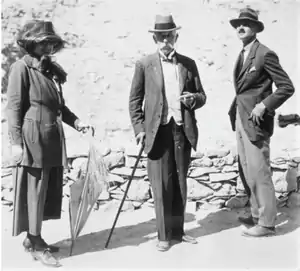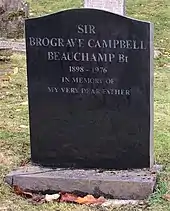Brograve Beauchamp
Sir Brograve Campbell Beauchamp, 2nd Baronet (5 May 1897 – 25 August 1976)[1] was a British National Liberal and Conservative Party politician.

Beauchamp was the son of the Liberal politician and Lloyd's chairman Sir Edward Beauchamp, 1st Baronet, and his second wife Betty Campbell Beauchamp (née Woods). Educated at Eton College, he served in the Life Guards during the First World War.[2] His elder brother, Edward Archibald Beauchamp, was killed in the war[3] and Brograve therefore succeeded to the baronetcy on the death of his father in 1925.[4] Sir Brograve died on 25 August 1976 at the age of 79, when the title became extinct.[5]
Political career
At the 1922 general election, Beauchamp stood as a National Liberal candidate for the Lowestoft division of Suffolk. His father had just stepped down as the constituency's MP, and Brograve hoped to win the seat, but he lost heavily.[6] He did not stand again until the 1931 general election, when he was elected as the Conservative Member of Parliament (MP) for Eastern division of Walthamstow. He was re-elected in 1935, and held the seat until he retired from Parliament at the 1945 general election.[6] While in Parliament, he held a number of Parliamentary Private Secretary appointments, including in 1940 to Sir John Reith, Minister for Transport, and in 1942–43 to Richard Law, Parliamentary Under-Secretary of State for Foreign Affairs.[7]
Family

On 8 October 1923, Beauchamp married Lady Evelyn Leonora Almina Herbert, daughter of the 5th Earl of Carnarvon at St Margaret's Church, Westminster.[8] They had one child, Patricia Evelyn Beauchamp (born 11 July 1925, died 7 October 2014).[9] Sir Brograve and Lady Evelyn are buried beside each other in Putney Vale Cemetery in South West London.[10][11]
In November 1922, before her marriage, Lady Evelyn and her father had been among the first people in modern times to enter the tomb of Tutankhamun in Egypt.[12] In the spring of 1923 Brograve and his parents visited Egypt, and were given a guided tour of Tutankhamun's tomb by the archaeologist Howard Carter.[13]
References
- "Baronetcies beginning with "B" (part 2)". Leigh Rayment's Baronetage pages. Retrieved 28 April 2009.
- Army officers' service papers, 1914-22
- Commonwealth War Graves Commission records
- Lundy, Darryl. "Sir Brograve Campbell Beauchamp, 2nd Bt". ThePeerage.com. Retrieved 28 April 2009.
- "Burke's Peerage 2003, page 699".
- Craig, F. W. S. (1983) [1969]. British parliamentary election results 1918–1949 (3rd ed.). Chichester: Parliamentary Research Services. pp. 265, 468. ISBN 0-900178-06-X.
- Dod's Parliamentary Companion. London: Business Directories Ltd. 1943. p. 334.
- Illustrated London News, Saturday 13 October 1923, page 6.
- "Burke's Peerage 1970, page 206".
- Putney Vale Cemetery: Burial and cremation records
- "Confirmed by photograph of graves".
- Bill Price. Tutankhamun, Egypt's Most Famous Pharaoh. pp. 119–128. Published Pocket Essentials, Hertfordshire. 2007. ISBN 9781842432402.
- William Cross. Carnarvon, Carter and Tutankhamun Revisited: The Hidden Truths and Doomed Relationships. p. 77 Published by author. 2016. ISBN 9781905914364.
External links
- Hansard 1803–2005: contributions in Parliament by Sir Brograve Beauchamp
- Portraits of Sir Brograve Beauchamp held by the National Portrait Gallery
| Parliament of the United Kingdom | ||
|---|---|---|
| Preceded by Harry Wallace |
Member of Parliament for Walthamstow East 1931 – 1945 |
Succeeded by Harry Wallace |
| Baronetage of the United Kingdom | ||
| Preceded by Edward Beauchamp |
Baronet (of Grosvenor Place) 1925–1976 |
Extinct |